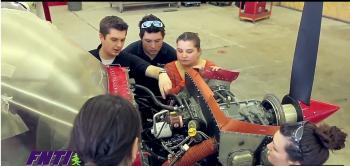Summary
Twelve Indigenous youth from across Canada are set to attend ground school, take part in C-172 training flights and simulator sessions from July 21 to July 28, and 10 out of those 12 youth are female recruits.
The training will take place at First Nations Technical Institute (FNTI) as part of the first Indigenous Youth Aviation Camp.
Student counsellors and FNTI employees will meet the youth in Toronto and travel to Tyendinaga Mohawk Territory to begin their training at the Aerodrome. Air travel for the students has been made possible by Air Creebec, Missinipppi Airways, Air Borealis, PAL Airlines, West Jet, Air Canada, Jazz Aviation and the Air Transportation Association of Canada (ATAC).
“We are excited to be providing this new opportunity to our youth,” said Jo-Anne Tabobandung, dean of aviation.
“Indigenous-owned airlines and industry partners are always looking for meaningful ways to encourage a career in piloting to the younger generation, which is considered to be key to the sustainability of many of our communities. We are thrilled to receive so much support from them to carry it out.”
That there are so many females interested in this training is impressive, said Tabobandung. Especially for such male-dominated field as aviation.
FNTI has been training Indigenous pilots since 1990, and more than 35 per cent who take the First Peoples’ Aviation Technology Flight three-year advanced diploma are female learners, reads a press statement from FNTI.
Just over five per cent of airline pilots in the industry are female, according to the International Society of Women Airline Pilots.
The industry predicts a global pilot shortage with as many as 617,000 new commercial airline pilots needed by 2035.
"These statistics are staggering. Indigenous peoples and women are critical to building capacity, averting skills shortages and creating sustainability to the aviation sector,” said Tabobandung.
“Moreover, pilot shortages are exacerbated in rural and remote communities. FNTI is a driver to overcome this challenge seeing as our graduates usually wish to return to their home communities.”
For more on the Flight program go to https://fnti.net/aviation-program.php

